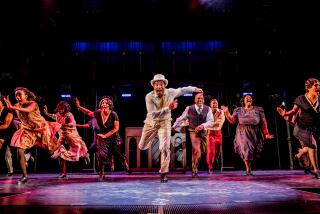A Jazzy Riff on a Dissipated Life
- Share via
An obscure footnote in the annals of jazz, Charlie Leeds was a brilliant bass player who sacrificed his talent to his heroin habit. After serving in World War II, Leeds returned to the New York club scene and found himself on a slippery slope leading to a lifelong addiction and a constant round of hospital stays and jail terms. By the early 1950s, his jazz career was largely over, although Leeds enjoyed a brief flare of celebrity with the publication of his 1970 book, “Tillie’s Punctured Romance and the Love Song of Rotten John Calabrese.”
Based on that book, “Beat for Sparrows” at the Ivy Substation fuses Leeds’ writings with a surreal treatment of his squandered life. The setting is the Atlantic City boardwalk in the early 1960s, but the action shifts continually to the 1940s, and Leeds’ youth.
The play wastes no time in shocking the system. Clearly itinerant, the older Leeds (Joseph Lennon McCord) wanders onto the boardwalk, finds his favorite bench and promptly shoots up.
Soon, Leeds is lost in reveries about his youthful self, played by a fiercely focused Josh Phillips. Young Charlie is besotted by the beautiful Rose (Laura Margolis), who develops a habit in short order. Charlie’s chief drug supplier and main antagonist is his fellow musician, Rotten John Calabrese (Andrew Lee Barrett). But don’t expect a linear retrospective. God (David St. James) and Noah (Gerald C. Rivers), who is trying to get his act and his ark together, also feature in the drug-fueled narrative.
As jazzy and emotionally charged as its subject, Joe Moretti’s sharp staging is realized with finger-snapping intensity by a crack cast and an ace design team. Christopher Pye’s set, Kris Sandheinrich’s lighting, John Zalewski’s sound, and Pamela Sullivan and Lee C’s period costumes keenly re-create the hipster scene of the 1940s, the era in which most of the action takes place. But in this play, ambience is all. Scratch the surface of this bebopping milieu and you will discover . . . a bebopping milieu.
Leeds used drugs as a springboard for his poetry, which he typically wrote while high. While they do capture the beat rhythms of these drugged improvisations, adapters Karen Schuler and Richard Miller fail to explore the deeper impulses behind Leeds’ peculiar pathology. Though structurally insubstantial, their airy riff is heartbreakingly nostalgic, an elegy for a poor soul whose demons sadly outstripped his hipness.
*
* “Beat for Sparrows,” Ivy Substation, 9070 Venice Blvd., Culver City. Fridays-Saturdays, 8 p.m.; Sundays, 7 p.m. Ends May 6. $20. (323) 655-8587. Running time: 2 hours, 15 minutes.
More to Read
The biggest entertainment stories
Get our big stories about Hollywood, film, television, music, arts, culture and more right in your inbox as soon as they publish.
You may occasionally receive promotional content from the Los Angeles Times.










